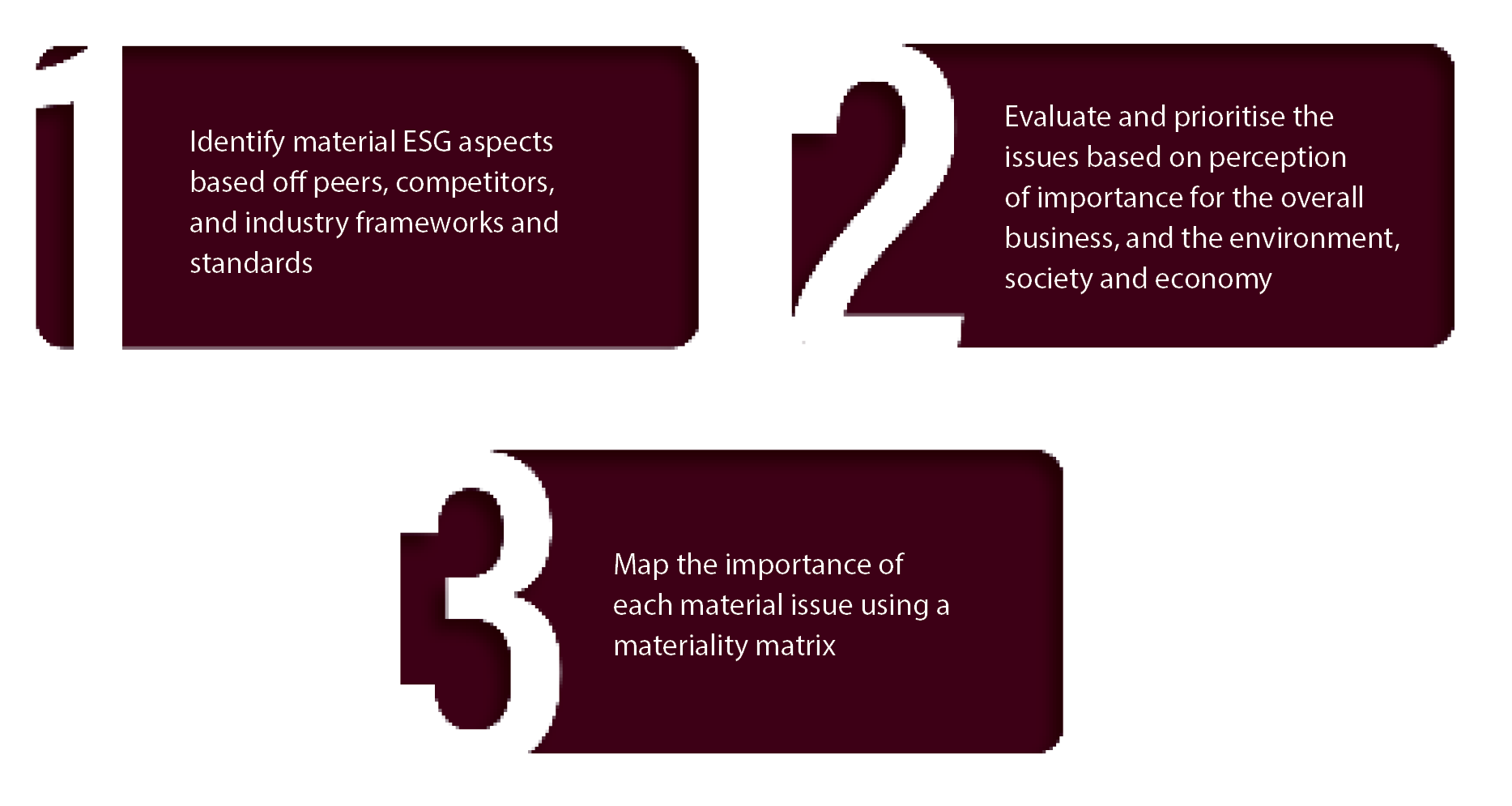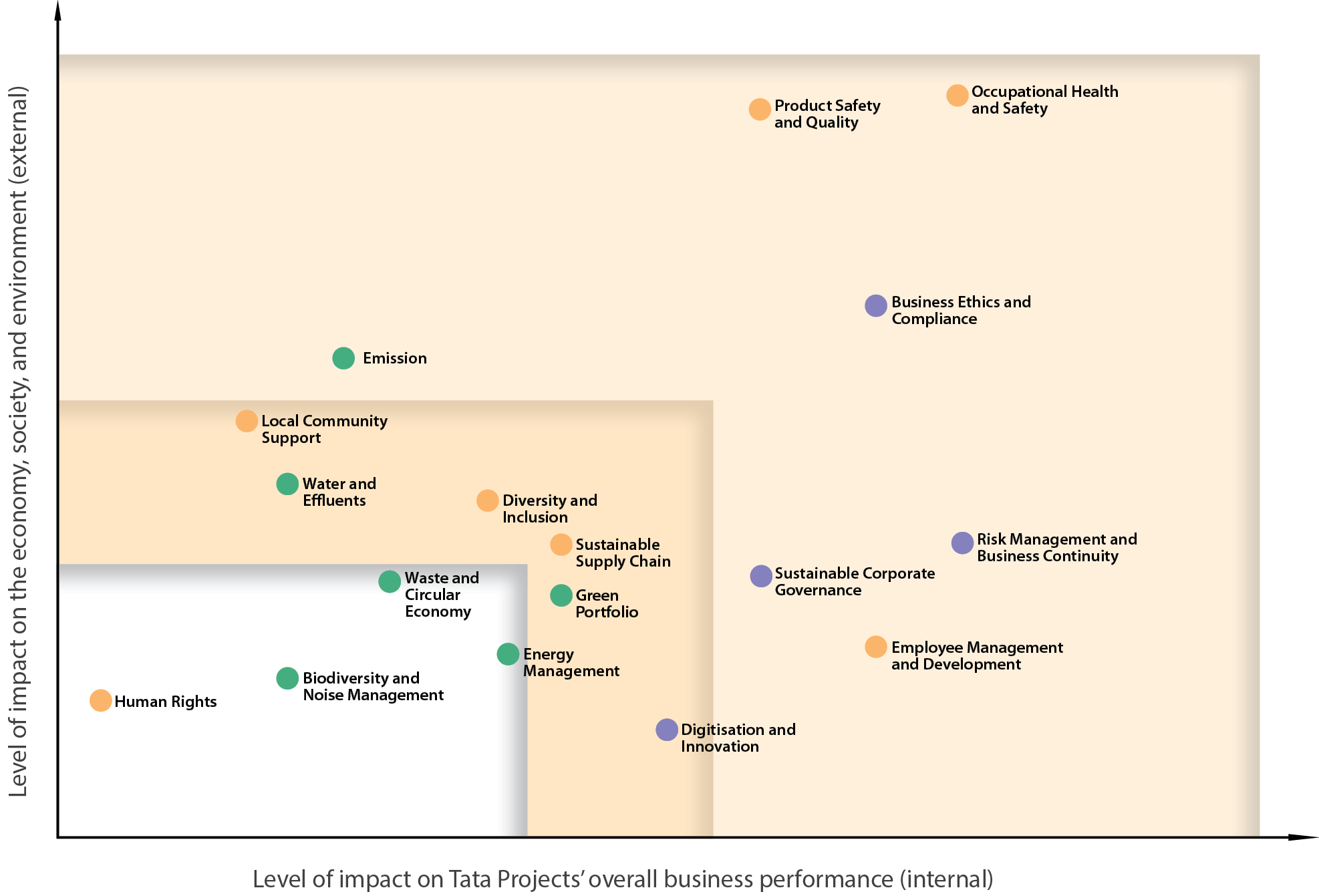MATERIALITY
ADDRESSING MATERIAL MATTERS
At Tata Projects, we identified, prioritised, and validated our strategic goals in line with the sustainability journey through effective driving of comprehensive stakeholder engagement process. Determining materiality helped understand topics relevant to our business and to various stakeholders
We conducted a structured materiality assessment, wherein we proactively engaged with our stakeholders with an internal and external point of view to understand issues that substantively influence their assessment and decisions. We also interacted with our top management to understand the strategic significance of our top issues and further prioritize them for defining the report content. We reviewed our earlier conducted materiality assessment to assess its relevance and adequacy to our current business scenario.
Our materiality assessment entailed revisiting our materiality matrix identified and prioritised as per their impacts on our business by conducting dissemination sessions in FY2018 to ensure the topics sufficiently signify our performance and risks through the business cycle.
There are 23 material aspects that have emerged. Of these, 13 aspects have emerged at high impact zone. These are – labour-management, occupational health & safety, economic performance, material management, employee, human rights, organisational governance, risk management, emissions, energy, water & waste management and local communities.
Materiality Analysis Process

Identification of Material Issues
Based on our proprietary benchmark and framework review process, we have isolated 17 sustainability issues that are material to Tata Projects. These issues are categorised under E, S and G.
Environment
- Emissions
- Energy management
- Green portfolio
- Waste and circular economy
- Water and effluents
- Bio-diversity and noise management
Social
- Diversity and inclusion
- Employee management and development
- Human rights
- Local community support
- Occupational health and safety
- Product safety and quality
- Sustainable supply chain
Governance
- Business ethics and compliance
- Digitisation and innovation
- Risk management and business continuity
- Sustainable corporate governance
TATA Projects Materiality Matrix

Chapter Reference
Economic
Towards a Sustainable Future
Corporate Governance
Corporate Governance
Environment
Simplifying Ecological Sustainability
| Material Topics | Key Action Point | FY2023 Highlights |
|---|---|---|
| Environment | ||
|
Emissions |
Focused interventions towards monitoring and reducing energy consumption through various energy and emission saving initiatives |
|
| Social | ||
|
Occupational Health and Safety |
Implementation of TQDigilytics to prompt increase in reporting observations & near misses Effective implementation of corrective actions from audits & incident learnings |
|
|
Product Safety and Quality |
Create a customer satisfaction survey to understand if the safety & quality expectations of each project is met Monitor and report the number of project reconstructions due to safety & quality issues | Safety & Quality expectations were being monitored through outcome of customer satisfaction survey and external customer survey shall be conducted in FY2024 |
|
Employee Management and Development |
Increase training hours for each employee & introduce job-specific mandatory training |
|
| Governance | ||
|
Business Ethics and Compliance |
|
|
|
Risk Management and Business Continuity |
Roll-out of integrated Risk Management program to acknowledge and address risk at every level |
|
|
Sustainable Corporate Governance |
Deploy an ESG roadmap with ambitious targets for each material topic, and identify responsible personnel for each target Build a better ESG understanding across board executives and BU leaders with compulsory annual ESG training |
Risk Assessment Criteria were clearly defined to distinguish between High, Medium and Low level of Risk Exposure. Appropriate options are explored and exercised to bring risk exposure within acceptable limits. Revised ESG Policy & charter were released & communicated across. |
Where the Impacts Occur
 Internal
Internal
 External
External
Our Involvement with the Impact
 Direct
Direct
 Indirect
Indirect